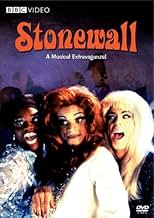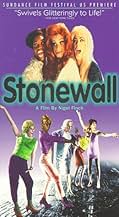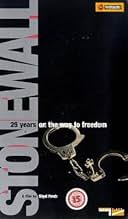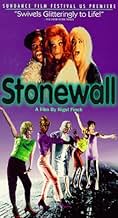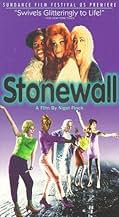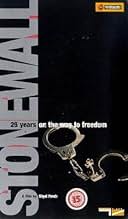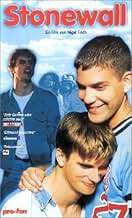IMDb RATING
7.1/10
1.8K
YOUR RATING
A group of homosexual people try to live with dignity and self-respect while events build to the opening battle in the major gay rights movement.A group of homosexual people try to live with dignity and self-respect while events build to the opening battle in the major gay rights movement.A group of homosexual people try to live with dignity and self-respect while events build to the opening battle in the major gay rights movement.
- Director
- Writers
- Stars
- Awards
- 3 wins & 2 nominations total
Guillermo Diaz
- La Miranda
- (as Guillermo Díaz)
Luis Guzmán
- Vito
- (as Luiz Guzman)
Meg Gibson
- Agnes
- (as Margaret Gibson)
- Director
- Writers
- All cast & crew
- Production, box office & more at IMDbPro
Featured reviews
10Boyo-2
Frederick Weller is the perfect embodiment of the frustrated gay male who is ready for a change, and a revolution to boot. He arrives in NYC, somewhat naive, and is befriended by a drag queen who introduces him to the city and its many characters. He is discouraged almost immediately but it starts a feeling in him that makes him uneasy about the way things are. At the time bars were getting raided constantly and there were other ridiculous laws, too, none of which sit well with him. He befriends another man who enlightens him about rallies, a peaceful march to Philadelphia, and takes him to Fire Island. But its all still bad, since he knows he's being treated badly because of who he is.
Climax of the movie is the riot at the end, which wasn't much of one as far as I'm concerned, but the police finally found they were being stood up to, and they didn't like it.
All the actors are excellent, especially Weller, who's inexplicably not a major star, and Guillermo Diaz as La Miranda, a not-as-tough-as-she-pretends-to-be drag queen. Its La Miranda's version of things, and when she says 'we're American as apple pie' as the last line of the movie, you can't help but believe her.
Kudos to all involved. 9/10.
Climax of the movie is the riot at the end, which wasn't much of one as far as I'm concerned, but the police finally found they were being stood up to, and they didn't like it.
All the actors are excellent, especially Weller, who's inexplicably not a major star, and Guillermo Diaz as La Miranda, a not-as-tough-as-she-pretends-to-be drag queen. Its La Miranda's version of things, and when she says 'we're American as apple pie' as the last line of the movie, you can't help but believe her.
Kudos to all involved. 9/10.
I have a great deal of admiration for this engaging effort to explain the roots of the modern gay rights movement, produced on a shoe-string by a director with an admirable sense of style, pacing, and resourcefulness. Though filtered through a distinctly British class-consciousness, it does a highly respectable job of catching the main trends in gay America from my not-quite-misspent youth.
Furthermore, it is candidly presented as a subjective, fictional account, mooting complaints like "the bus is too old," "no New York apartment is that big" and "the Stonewall bar never looked that clean."
Nonetheless, one small detail and one large item are egregiously wrong. The detail is the rather elementary fact that the Stonewall was never licensed; it was a "private" mob-run club. It was raided not because all cops are homophobes but because, in the absence of official licensing, gay bars were, in every sense, illegal. The scenes where Stonewall employees display great care about the liquor laws are ridiculous, since the bar operated outside the law.
The larger item is the failure to capture the sense of exhilaration that swept throught the country in 1969. This was the year men walked on the moon, the year of Woodstock, the year an X-rated gay-themed film ("Midnight Cowboy") won the "Best Picture" Oscar, and (biggest miracle of all to us New Yorkers) the year the Mets, long "lovable losers," won the World Series. Anything was possible, and gay people joined the party with enthusiasm.
Furthermore, it is candidly presented as a subjective, fictional account, mooting complaints like "the bus is too old," "no New York apartment is that big" and "the Stonewall bar never looked that clean."
Nonetheless, one small detail and one large item are egregiously wrong. The detail is the rather elementary fact that the Stonewall was never licensed; it was a "private" mob-run club. It was raided not because all cops are homophobes but because, in the absence of official licensing, gay bars were, in every sense, illegal. The scenes where Stonewall employees display great care about the liquor laws are ridiculous, since the bar operated outside the law.
The larger item is the failure to capture the sense of exhilaration that swept throught the country in 1969. This was the year men walked on the moon, the year of Woodstock, the year an X-rated gay-themed film ("Midnight Cowboy") won the "Best Picture" Oscar, and (biggest miracle of all to us New Yorkers) the year the Mets, long "lovable losers," won the World Series. Anything was possible, and gay people joined the party with enthusiasm.
The night they raided the NYC underground bar Stonewall was the night gay pride exploded into the mainstream. This film tells the story of that night through a group of characters who each shine with their own unique story. There's La Miranda and Matty Dean, the central fictional figures of this film, and their struggle to find love, respect and honour in 1969 against numerous odds. But there are many other important stories told in this beautiful film. Dazzling, bright, strong and rousing are just four words but they settle easily into any sentence describing Stonewall - the movie. Its one of the most colourful and well designed films I've seen - so lush and grand in its set design and the musical numbers blaze. This delicious film is an aching, sweet transport into another time and place and provides a jaunty historical summation of the pride and intensity the name Stonewall still retains in the twentieth century history of the gay experience. Its a love story, a political tale, a drag odyssey and a wonderful expression of the powerful bonds that dark times promote and cement. Most of all, its a film to share with people you care about and want to grow through life with - so march to see it now.
10orbiT
this is one of the great low-budget "queer cinema" triumphs of the 90s'....
contrary to the above commenter, i do think the details are right... and yes, the cops were homophobic.. they used arcane, outdated laws to close gay bars.. have u read the book "stonewall"? they make it very clear that lots of bars - gay and str8 - were "illegal".. only the gay ones were shut down..
i was very impressed by the right-on details in the production design..
contrary to the above commenter, i do think the details are right... and yes, the cops were homophobic.. they used arcane, outdated laws to close gay bars.. have u read the book "stonewall"? they make it very clear that lots of bars - gay and str8 - were "illegal".. only the gay ones were shut down..
i was very impressed by the right-on details in the production design..
A young gay man from the sticks comes to New York City in 1969 hoping for a better life, but finds the homosexual lifestyle just as stifled in the big city under police pressure, corruption and harassment. The legendary gay riots near the Stonewall Inn take up just five minutes of the film's running-time, the final five minutes. This low-budget, brightly-colored film is more interested in the lives that would soon be affected by the riots than in the aftermath of the violence--and so we get stock characters like the naive blond cowboy, the underworld group controlling the club, the straight-seeming activists for a Homosexual Alliance, and lots and lots of drag queens. Director Nigel Finch seems to make a concerted effort to equate homosexuality with drag behavior, and drag behavior with (ultimately) prostitution. Perhaps this was true of the times, but Finch's presentation (though not campy) has cartoonish leanings and nostalgic overtures that don't express anything more than what most people already realize: the cops were corrupt, the gays were not saints, and they clashed. There's a good movie to be made about Stonewall, but this one just scratches the surface. There are some sweet moments (a sing-along on a bus, a dance between a drag queen and a gay conservative), but just as many scenes where the tone intended hasn't a hope in hell of coming through. ** from ****
Did you know
- TriviaDirector Nigel Finch died of AIDS shortly after completing this, his last film.
- GoofsThe sip-in depicted took place in 1966, not 1969. It was not the Stonewall Inn that refused service, but a bar called Julius (which is shown as the sip-in's first stop in the film).
- Quotes
Princess Ernestine: La Miranda, girl, why do you always put yourself though this?
La Miranda: Why, Princess Ernestine? It's for the sheer, irresistible goddamn glamour of it all.
- ConnectionsEdited into Screen Two: Stonewall (1997)
- SoundtracksAnother Green World
(Arena Theme)
Written and Performed by Brian Eno
Music with permission of BMG Music Publishing Limited
Recording with permission of Virgin Records Limited
- How long is Stonewall?Powered by Alexa
Details
- Release date
- Countries of origin
- Language
- Also known as
- Стоунвол
- Filming locations
- Production companies
- See more company credits at IMDbPro
Box office
- Gross US & Canada
- $692,400
- Opening weekend US & Canada
- $74,052
- Jul 28, 1996
- Gross worldwide
- $692,400
Contribute to this page
Suggest an edit or add missing content


